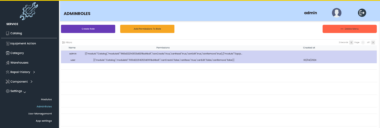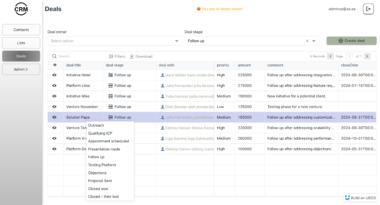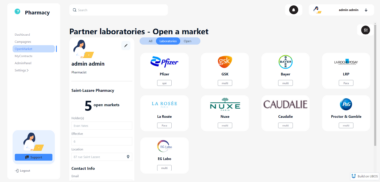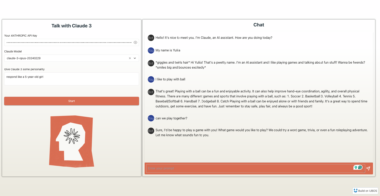UBOS Asset Marketplace: Unleashing the Potential of PDFs with the MCP PDF Server
In today’s data-driven world, PDFs remain a ubiquitous format for documents, reports, and archives. However, extracting valuable information from these files can often be a cumbersome and time-consuming task. The MCP PDF Server, now available on the UBOS Asset Marketplace, provides a robust and efficient solution for automating PDF processing, unlocking a wealth of possibilities for AI-driven applications and workflows.
What is the MCP PDF Server?
The MCP PDF Server is a specialized server designed to facilitate seamless interaction between AI models and PDF documents. Built upon the foundation of FastMCP, this server offers a comprehensive suite of tools for extracting text, performing Optical Character Recognition (OCR), and retrieving images from PDF files. Its integration with the Model Context Protocol (MCP) ensures standardized communication with Language Learning Models (LLMs) and other AI agents, enabling developers to easily incorporate PDF processing capabilities into their applications.
Key Features of the MCP PDF Server
read_pdf_text: This powerful feature allows you to extract plain text from PDF documents on a page-by-page basis. It’s ideal for quickly obtaining the textual content of PDFs without the need for complex parsing or OCR.read_by_ocr: For scanned documents or image-based PDFs where text is not directly accessible, theread_by_ocrfeature employs OCR technology to recognize and extract text. This opens up possibilities for processing archival documents, images, and other non-standard PDFs.read_pdf_images: Need to extract images from a PDF? Theread_pdf_imagesfeature allows you to retrieve all images from a specific page, encoded in Base64 format. This is perfect for applications involving image analysis, content repurposing, or archiving.
Use Cases: Transforming PDF Data into Actionable Insights
The MCP PDF Server empowers a wide range of use cases across various industries. Here are just a few examples:
- Automated Data Extraction: Automate the extraction of data from invoices, financial statements, and other structured documents, eliminating manual data entry and reducing errors.
- Content Analysis and Summarization: Analyze the content of research papers, legal documents, and other long-form PDFs to identify key themes, extract summaries, and generate insights.
- Archival Document Processing: Digitize and process archival documents by using OCR to extract text from scanned images, making them searchable and accessible.
- Image-Based Content Retrieval: Extract images from product catalogs, marketing materials, and other visual PDFs for use in e-commerce, advertising, and other applications.
- AI-Powered Chatbots and Virtual Assistants: Enable chatbots and virtual assistants to answer questions based on the content of PDF documents, providing users with instant access to information.
- Compliance and Risk Management: Analyze PDF documents to identify potential compliance issues, assess risks, and ensure adherence to regulatory requirements.
- Knowledge Management: Build a knowledge base by extracting and indexing information from a collection of PDF documents, making it easy for users to find relevant information.
Project Structure: A Modular and Maintainable Design
The MCP PDF Server boasts a well-organized project structure, making it easy to understand, modify, and extend. The key components include:
pdf_resources/: This directory serves as the central location for storing uploaded and processed PDF files.txt_server.py: This is the main server entry point, responsible for handling requests and coordinating the PDF processing tasks.README.md: The project documentation provides comprehensive information about the server’s features, installation, usage, and API.
Installation and Setup: Getting Started with Ease
Setting up the MCP PDF Server is a straightforward process. The recommended Python version is 3.9 or higher. Simply install the necessary dependencies using pip:
bash pip install pymupdf mcp
To utilize the OCR features, ensure you have a MuPDF build with OCR support or have installed external OCR libraries.
Starting the Server: Bringing Your PDF Processing to Life
Once the installation is complete, start the server by running the following command:
bash python txt_server.py
You should see logs indicating that the server is running and listening for requests. For example:
Serving on http://127.0.0.1:6231
Web Debugging Interface: Testing and Debugging Made Simple
The MCP PDF Server includes a built-in web debugging interface, allowing you to easily test and debug the various API tools without writing any code. Simply open your browser and visit the address displayed in the logs (e.g., http://127.0.0.1:6231).
The web UI provides a user-friendly interface for selecting tools, entering parameters, and running tests. This simplifies the process of experimenting with different settings and ensuring that the server is functioning correctly.
API Tool List: A Comprehensive Set of PDF Processing Functions
The MCP PDF Server offers a rich set of API tools for performing various PDF processing tasks. Here’s a summary of the available tools:
| Tool | Description | Input Parameters | Returns |
|---|---|---|---|
read_pdf_text | Extracts normal text from PDF pages | file_path, start_page, end_page | List of page texts |
read_by_ocr | Recognizes text via OCR | file_path, start_page, end_page, language, dpi | OCR extracted text |
read_pdf_images | Extracts images from a PDF page | file_path, page_number | List of images (Base64) |
Example Usage: Putting the Tools to Work
Here are some examples of how to use the MCP PDF Server API:
Extract text from pages 1 to 5:
bash mcp run read_pdf_text --args ‘{“file_path”: “pdf_resources/example.pdf”, “start_page”: 1, “end_page”: 5}’
Perform OCR recognition on page 1:
bash mcp run read_by_ocr --args ‘{“file_path”: “pdf_resources/example.pdf”, “start_page”: 1, “end_page”: 1, “language”: “eng”}’
Extract all images from page 3:
bash mcp run read_pdf_images --args ‘{“file_path”: “pdf_resources/example.pdf”, “page_number”: 3}’
Important Notes: Ensuring Optimal Performance
- Ensure that PDF files are placed inside the
pdf_resources/directory or provide an absolute path to the file. - The OCR functionality requires appropriate OCR support in your environment.
- When processing large files, adjust memory and timeout settings as needed to prevent errors.
License: Open Source and Ready for Innovation
The MCP PDF Server is licensed under the MIT License, making it free to use, modify, and distribute. If you use the server for commercial purposes, please credit the original source.
Integrating with UBOS: The Full-Stack AI Agent Development Platform
The MCP PDF Server seamlessly integrates with the UBOS platform, a full-stack AI Agent development platform designed to empower businesses with AI-driven automation. UBOS allows you to orchestrate AI Agents, connect them with your enterprise data, and build custom AI Agents using your own LLM models. By integrating the MCP PDF Server with UBOS, you can unlock powerful new capabilities for your AI Agents, such as:
- Automated Document Processing Workflows: Create AI Agents that automatically extract data from PDFs, process it, and use it to trigger other actions within your business.
- Intelligent Information Retrieval: Build AI Agents that can answer questions based on the content of PDF documents, providing users with instant access to information.
- Personalized Content Generation: Generate personalized content based on the information extracted from PDF documents, such as reports, summaries, and recommendations.
With the UBOS platform and the MCP PDF Server, you can unlock the full potential of your PDF data and transform it into actionable insights.
In conclusion, the MCP PDF Server on the UBOS Asset Marketplace provides a valuable tool for developers and businesses looking to automate PDF processing and integrate it into their AI-powered workflows. Its comprehensive feature set, easy-to-use API, and seamless integration with the UBOS platform make it an essential asset for unlocking the power of PDF data.
MCP PDF Server
Project Details
- DeepSeekMine/mcp-pdf-reader
- Last Updated: 4/30/2025
Recomended MCP Servers


This read-only MCP Server allows you to connect to Confluence data from Claude Desktop through CData JDBC Drivers....

Query and Summarize your chat messages.
Model Context Protocol Servers

Integrator MCP Server
Playwright Model Context Protocol Server - Tool to automate Browsers and APIs in Claude Desktop, Cline, Cursor IDE...

MCP Server for interacting with LogSeq graph
puppeteer + mcp + steel [WIP]
B12's model context protocol server for generating websites with AI
 From vibe coding to vibe deployment. UBOS MCP turns ideas into infra with one message.
From vibe coding to vibe deployment. UBOS MCP turns ideas into infra with one message.






